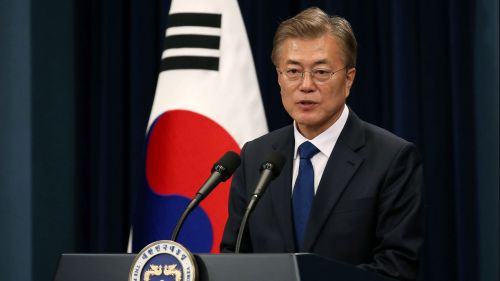Real Estate Weighs on Moon's Approval Rate

Karl Friedhoff examines South Korea's President Moon Jae-in's administration and the real estate issues, including high rental costs in Seoul, that have led to a high disapproval rating.
President Moon and Real Estate
In May, South Korea's Moon administration was riding high, with approval rates in the low-70s driven by efficient handling of the COVID-19 pandemic and a historic victory in the country's April National Assembly elections. But in the months that followed, these approval rates declined—now standing at 39 percent—driven not by the increase in COVID-19 cases in the country, but by the controversy surrounding the real estate sector.
Throughout August, real estate issues remained the top reason for President Moon's disapproval. The core problem is the soaring prices of apartments, especially in the capital of Seoul. Since Moon Jae-In's inauguration in 2017, prices of apartments in Seoul rose by 55 percent. With no concrete solution in sight, 55 percent of citizens in August predicted a rise in apartment prices nationwide, with only 13 percent predicting a decline.
Jeonse
In South Korea, apartment complexes are the main sources of housing, with three main means of home procurement. The first two methods are seen commonly in other parts of the world: individual home ownership via a bank mortgage and monthly rental. The third is a system unique to South Korea, called jeonse, often translated as "key money". This system requires tenants to pay a large lump sum in advance instead of paying monthly fees. For example, a medium-sized apartment in Seoul can cost up to $550,000 in jeonse fees. Jeonse is commonly used by homeowners because they are able to invest the large deposit, and during the time of the lease, usually around 2 years, tenants can save money to buy a home of their own. The owner and tenant can then agree to extend the lease for another term, with applicable increases, or can terminate the lease. If the lease is ended, the original deposit amount is returned to the tenant.;
Depending on the value of the home, land, or building owned, owners are charged property tax ranging from 0.7 percent to 5 percent. But recently, the government has taken steps to combat rising home prices, including increasing average property taxes from 3.2 percent to 6 percent for those who own three or more homes. Homeowners have revolted and are hiking jeonse deposits in response. In turn, the rise in jeonse deposits is pricing many families out of the housing market.
With homeowners and home-seekers both upset, 65 percent of the public disapprove of the Moon administration's attempt to reign in home prices. And there is little hope that the situation will be resolved any time soon—66 percent predict that apartment prices will rise as it did over the last ten years, with only 8 percent predicting its fall.
With North Korea and its threats so widely covered in the media, it is often easy to assume that declining approval rates of a South Korean president are linked to unsatisfactory diplomatic and security policies. But President Moon's approval decline is mostly associated with dissatisfaction of his domestic economic and public welfare policies. This serves as a good reminder that while North Korea may attract the attention of much of the foreign audience, for South Koreans it remains domestic politics—not North Korea—that drives attitudes towards leadership.

